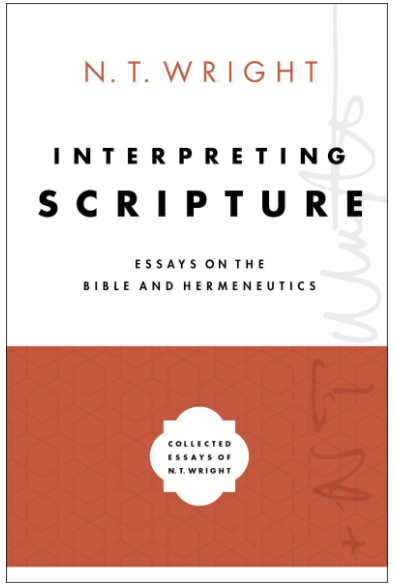Ted Grimsrud—November 1, 2021
N.T. Wright. Interpreting Scripture: Essays on the Bible and Hermeneutics. Zondervan Academic, 2020. xii + 387pp.
This interesting collection of essays by the prominent New Testament professor N. T. Wright gives a chronological record of his interaction with biblical texts dating from 1997 to 2020. Most of the twenty-two essays have been published in various obscure journals and essay collections. They are all vintage Wright, mixing careful reading of texts with theological analysis. The essays are scholarly but written with Wright’s characteristic clarity and accessibility.
The title of the book is a bit misleading, though. Particularly, the term “hermeneutics” in the subtitle promises a theme that the book does not actually touch on. It would be quite useful to have some essays by Wright reflecting on the philosophy of biblical interpretation. His thoughts in that area surely are worth attending to. However, these are mainly essays that show how he interprets the specific biblical texts and addresses specific biblical themes, not essays that step back and examine the act of interpretation itself.
This is one of three volumes published simultaneously by Zondervan Academic, the other two being collections of essays focused on Jesus and on Paul respectively. This third volume could be understood as essays on what was left over. Even so, a few essays on Paul and on Jesus find their way into Interpreting Scripture, suggesting that the selection criteria were not scrupulously followed.
For readers familiar with Wright’s work, Interpreting Scripture does not offer much that is new. Such readers may be interested, though, in the mildly autobiographical element of this collection. The essays themselves are unchanged from their original publications, but Wright has added short introductions to each essay. These often add interesting snippets about Wright’s professional life at the time of presentation. As well, several of the essays are tributes to other scholars and include accounts of Wright’s relationships with the people he writes about. A particularly interesting example is the essay, “God and Caesar, Then and Now,” that is based on a lecture given as part of the recognition of the 50th anniversary of Queen Elizabeth’s coronation. Wright expresses a somewhat surprisingly affirmative view of the British monarchy.
Since this is the non-Jesus and Paul volume (with a couple of exceptions), we get a sampling of Wright’s thoughts on various themes that to some degree fall outside the parameters of the main things he has focused on—such as New Testament perspectives on prayer, relations to government, joy, pastoral theology, mission, public worship, and atonement theology. These are all interesting, as a rule strongly focused on biblical interpretation, and (as always with Wright) engagingly written.
Wright’s generous engagement with several prominent British New Testament scholars of the previous generation—G. B. Caird, Lesslie Newbigen, and John A. T. Robinson—are interesting both for his analysis of their ideas and for his account of his relationship with them and assessment of the importance of their work.
The essays I particularly appreciated engaged questions of faith and politics (“”God and Caesar, Then and Now” and “Neither Anarchy nor Tyranny: Government and the New Testament), the book of Revelation (“Revelation and Christian Hope: Political Implications of the Revelation to John”), and a summary of Wright’s views on atonement theology (“Get the Story Right and the Models Will Fit: Victory Through Substitution in ‘Atonement Theology’”).
Interpreting Scripture is a physically attractive book that includes snippets of Wright’s fascinating thinking on a wide variety of themes. No topic is given in-depth treatment, but with the book’s helpful bibliographical data it can serve as a stimulus to encounter Wright’s many other writings where he develops his perspective more thoroughly.

Thanks for the write-up, Ted.
“A particularly interesting example is the essay, “God and Caesar, Then and Now,” that is based on a lecture given as part of the recognition of the 50th anniversary of Queen Elizabeth’s coronation. Wright expresses a somewhat surprisingly affirmative view of the British monarchy.”
I was a little surprised that you should find this surprising. Most Brits would, I think, assume, in the absence of evidence to the contrary, that Anglican churchmen – especially senior ones – tend to be supportive of the monarchy. After all, the monarch is titular head of the Church of England, and priests have to formally and publicly swear allegiance to him or her during their ordination.
Sorry for my ignorance, Rob. What you say makes perfect sense and fits with what Wright actually wrote. It just seems so ridiculous….
Ted, please don’t apologise. I’m sorry if I made you feel you ought to have known – which, of course, you shouldn’t.
As for it seeming ridiculous, often it takes an outside perspective like yours to help us see the ridiculousness of things we are otherwise so accustomed to that we consider them entirely normal.